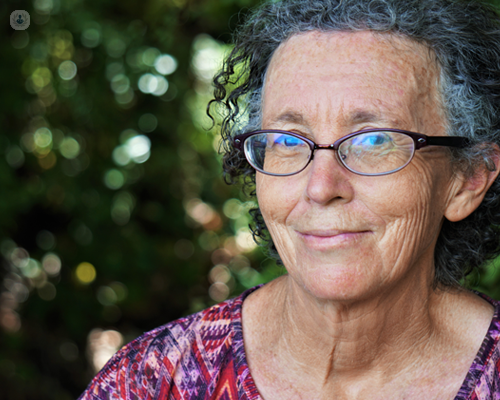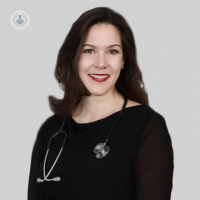Understanding the risk of HRT and breast cancer
Escrito por:HRT, or hormone replacement therapy, has been in the news recently. Low doses of the treatment are now available over the counter (beginning September 2022), and while some people still associate HRT with developing breast cancer, the benefits are scientifically proven to outweigh the risks.
Leading general practitioner Dr Victoria Owen looks at understanding the risks involved in HRT in this in-depth article, and combined with recent findings from the National Institute for Health and Care Excellence (NICE) that there’s little or no change in the risk of breast cancer with oestrogen-only HRT, she considers the quality of life that HRT offers, among many interesting points.

What is HRT and how does it work?
Hormone Replacement Therapy (HRT) is a common medication, and it’s used to alleviate menopause symptoms. It works by replacing the hormones oestrogen and progesterone that a woman’s body stops producing over several years as it begins its journey through menopause.
The treatment was first introduced in the 1960s, gaining popularity in the 1990s when HRT developed an association with breast cancer. This caused concern for many women about using HRT. Its use was then placed under scrutiny but today, however, it remains the approved first-line standard of care.
- It’s recommended to alleviate symptoms including vasomotor symptoms and genitourinary symptoms;
- Prevention of bone loss and fracture has been shown with HRT;
- It’s also proven to assist with joint pain and help with mood, sex drive, sleep and quality of life.
For most newly menopausal women, HRTs benefits certainly outweigh the risks. It’s the approved standard of care and it should be made available to all symptomatic women at the time of the menopause. Each woman should be assessed individually, however, and offered an appropriate choice of treatment.
What is the reason that patients think hormone therapy causes breast cancer?
A study called ‘The Woman’s Health Initiative Study: 2002’ was released, and in this report the relative risk of getting breast cancer was shown to be 28 per cent. However, it was misreported as 28 per cent of women develop breast cancer.
What this study actually showed, was, normally 30 in 10,000 women develop breast cancer. However, if women take HRT, then 38 in 10,000 develop breast cancer.
The number of extra cases caused by hormone therapy, or the attributable risk of breast cancer from hormone replacement therapy, was 9 per 10,000 in excess cases.
The reports in the media weren’t scientifically sound, and in addition, the increase in risk of getting breast cancer from hormone therapy wasn’t statistically significant when the study was properly analysed.
The use of hormone therapy reduced by 80 per cent, and 70 per cent stopped treatment within a year, meaning an entire generation of women missed out on hormone treatment.
What are consequences of the newspaper reports about HRT?
As a result of the reduction in hormone therapy, there were many women who died prematurely in the US between 2002 and 2012. The number of women is estimated to be between 18,000 and 100,000.
There was also an increase of 55 per cent of hip fractures in the group of women that stopped HRT.
Misconceptions around HRT remain 20 years after the study, and many women still believe hormone therapy is dangerous and causes breast cancer. Currently, there’s an underestimation of common risks from not taking HRT, while overestimating the rare risks associated with taking hormone therapy.
It’s paramount these risks are balanced against the benefits of HRT, and it must be put into perspective. Risk also varies by age. Breast cancer is a rare risk from HRT.
Which hormones cause the risk when taking hormone replacements?
HRT consists of progesterone and oestrogen. It’s the progesterone element of the replacement therapy which increases the risk of breast cancer. However, the progesterone element is needed because it protects the womb.
The risk of breast cancer is reduced by the oestrogen element, but it isn’t possible to take oestrogen on its own if the patient still has a womb. The patient needs to take both oestrogen and progesterone.
Other considerations to make regarding breast cancer risk
Several facts, both genetic and environmental, are related to the risk of developing any cancer.
- Genetic facts such as race, and breast density causes risk to vary.
- Environmental factors can contribute to risk, and they can be reduced by changes in lifestyle. It’s thought that 34 per cent of breast cancers can be modified or reduced by reducing alcohol intake, exercising regularly and avoiding post-menopausal obesity.
Follow the advice below about help to reduce risk of cancer:
- Diet: Limit your intake of processed foods high in fat and starch, and fast foods. Eat wholegrains, fruit, vegetables and beans.
- Be active;
- Be a healthy weight;
- Limit alcohol consumption;
- Don’t smoke;
- Get the recommended amount of sleep every night;
- Sleep well;
- Limit your caffeine intake.
If you wish to reduce risk of getting breast cancer with HRT after deciding to go ahead with the treatment, the general principles are:
- Maintaining a healthy weight;
- Eating smart;
- Keeping active;
- No smoking;
- Reduce alcohol intake
What we know now about HRT and associated breast cancer risk
The impact of the Scientific Journal of US means that the risk of breast cancer has stopped women from taking hormone treatment. Negative and incorrect first impressions have been very difficult to reverse following the publication of the study in 2022, and it has led to a reduction in quality of life for an entire generation of women.
This is now changing, thankfully. It’s possible to undertake HRT and modify other risk factors to protect against breast cancer.
Duration of HRT needs to be individual to each patient. It’s no longer the idea of ‘lowest dose for the shortest time’. It’s now: ‘Appropriate dose, appropriate patient and appropriate period of time.’
The main opportunity to start HRT is before 60 years of age, but hormone therapy can start at an older age with medical advice.
It’s no longer necessary to stop HRT after five years, because we know that now, the duration of use should be individualised to each patient.
If you’d like to start HRT, have concerns related to HRT or require a different approach to HRT, arrange an appointment with Dr Victoria Owen via her Top Doctor profile.


